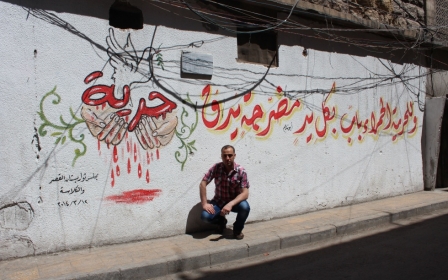Egyptian singer releases new album of resistance songs

While political resistance in Egypt has become increasingly risky - with protesters regularly detained and laws used to curb activism - other forms of resistance are on the rise.
A popular Egyptian singer and songwriter, Hamza Namira, released his new album "Esma’ni" on 10 December, featuring several songs that address his home country’s social and political dilemmas.
Produced by the London-based Awakening Records, Namira’s album "Listen to me" has been released in stores and on a number of online platforms such as YouTube, iTunes, Spotify and Soundcloud.
Hours after its online release, Namira's video clips garnered tens of thousands of views with a particularly high number of hits for the album's title track, which gained 150,000 views, reported Al-Ahram daily news.
The album comes three weeks after his songs were reportedly banned from Egyptian national radio, after his name was excluded from a new list of artists that can be featured on state radio.
Abdel-Rahman Rashad, head of Egypt's state radio, told Al-Ahram that Namira's was one of many names that did not make it onto the new list. He also told BBC that a performer that criticises the Egyptian authorities should not have his music played.
'Oh Opressed One'
The series of songs on YouTube include video clips complete with artwork, and lyrics in Arabic with their English translation.
The songs tackle topics such as conflicts between the generations against the backdrop of the Egyptian revolution, Cairo's traffic jams, injustice and oppression and praise for Prophet Mohammed, among many others.
His song ‘Oh Oppressed One’ talks about the inevitable return of justice, no matter how much time passes: “Oh oppressed one rest assured, your right will never be wasted, one day oh oppressor, you will pay for actions."
The video clip for the song includes footage in black and white of several global cities.
The video clip for another song, ‘Dalemet keda leh’, features comic strips showing a protagonist struggling with Cairo's traffic, saying: "From the morning I'm drowning in troubles... Why am I stuck in this traffic jam... I should have never come to this city."
Namira, hailed as a prodigy of Sayed Darwish's, an Egyptian singer and composer considered to be the father of Egyptian popular music, is known for songs that touch on social and humanitarian issues.
He is particularly known for his support of the 25 January revolution and was among several famous artists who took part in the 2011 uprising. Following the overthrow of former President Hosni Mubarak, Namira emerged as a major public figure with his songs regularly played on national television and radio.
His breakthrough success came in 2008, after the release of his debut album ‘Dream with me’. He has a very large base of followers – 4.5 million on Facebook and 2.5 million on Twitter - and is considered one of the Egypt’s most prominent artists.
New MEE newsletter: Jerusalem Dispatch
Sign up to get the latest insights and analysis on Israel-Palestine, alongside Turkey Unpacked and other MEE newsletters
Middle East Eye delivers independent and unrivalled coverage and analysis of the Middle East, North Africa and beyond. To learn more about republishing this content and the associated fees, please fill out this form. More about MEE can be found here.




